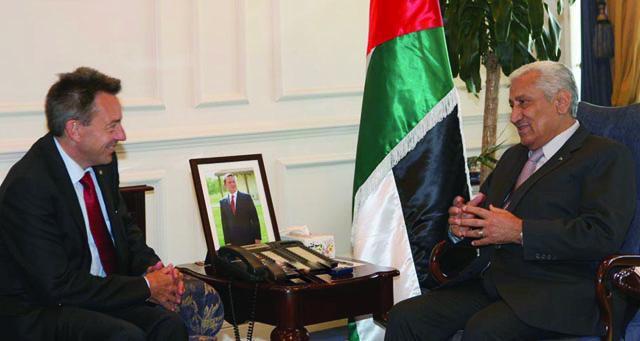You are here
World should address root cause of refugee crises in region — Red Cross
By Muath Freij - Sep 01,2014 - Last updated at Sep 01,2014
AMMAN — Jordan’s generosity in hosting a great number of refugees has to be a wake-up call for the international community to get to the root of the problem and prevent mass exoduses in the region, according to International Committee of The Red Cross (ICRC) President Peter Maurer.
In an interview with The Jordan Times on the sidelines of the opening ceremony of a photo exhibition depicting the ICRC’s activities over the past 150 years, Maurer said he himself and many humanitarian organisations and countries are immensely grateful for the fact that Jordan is able to receive so many refugees.
“The international community will have to more extensively support, not only activities in Syria, in order to prevent further spillovers into neighbouring countries, but also to generously support the impact of the Syrian crisis [on] neighbouring countries,” he added.
Maurer said regional developments forced the ICRC to considerably scale up its budget.
“It’s distressing to see that after 150 years of existence, we are ending up with a budget which is the highest in our history,” he added.
“It is good for the people whom we can help, but of course it is an indicator that developments in the region and the dynamics of the conflicts are difficult and cause a lot of suffering to civilian populations.”
The total budget for the organisation’s activities in Syria in 2014 will reach approximately $157 million; it was initially around $119 million.
In Jordan, the budget is around $35.6 million, after initially having been around $17.5 million.
Maurer said the ICRC also wants to give attention to local host communities.
“Some of our medical, water and sanitation projects really try to have beneficiaries not only with the refugees but also with the local population.”
He said negotiating access to populations in need and ensuring the protection of ICRC workers is becoming more complex because of the growing number of armed groups in the region.
“Because instead of having one or two well-structured opposition groups, we are finding ourselves [dealing] with tens of hundreds of groups in charge of some part of land either in Syria or Iraq,” Maurer noted.
The ICRC’s photo exhibition, inaugurated by HRH Prince Hassan in Amman on Saturday, showcased the international organisation’s humanitarian activities in Jordan and the entire region, according to ICRC Spokesperson Hala Shamlawi.
“The major focus of the exhibition is our history in Jordan and the region. We were in Jordan temporarily in 1948 and we established the first refugee camp in the city of Irbid. Since 1967, we have been in Jordan permanently,” she told The Jordan Times.
“The exhibit is a good opportunity to remind ourselves what the basic values of humanitarianism are and that after 150 years they are still topical,” Maurer said.
Shamlawi said the “moving” pictures show times of war and the ICRC’s humanitarian response to the victims of war.
She added that the photos showcased at the one-day exhibition, which was held at the Royal Automobile Museum, were taken by ICRC staff in several places, including Libya, Yemen, Gaza, Jordan, Iraq and Syria.
Related Articles
Deputising for His Majesty King Abdullah, Prime Minister Abdullah Ensour met on Monday with International Committee of the Red Cross (ICRC) President Peter Maurer and discussed international support to Jordan.
AMMAN — The president of the International Committee of the Red Cross (ICRC), Peter Maurer, completed a two-day visit to Jordan on Saturday,
The unprecedented flow of refugees is putting an equally unprecedented strain on the economies and infrastructures of host countries like Jordan, Lebanon and Turkey with respective political consequences, the International Committee of the Red Cross (ICRC) said Thursday.












